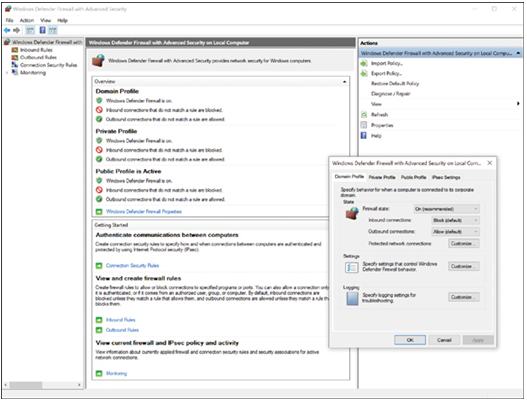Host-Based Malware Protection (39.4.3)
The network perimeter is always expanding. People access corporate network resources with mobile devices that use remote-access technologies such as VPN. These same devices are also used on unsecured, or minimally secured, public and home networks. Host-based antimalware/antivirus software and host-based firewalls are used to protect these devices.
Antivirus/Antimalware Software
This is software that is installed on a host to detect and mitigate viruses and malware. Examples are Windows Defender Virus & Threat Protection, Cisco AMP for Endpoints, Norton Security, McAfee, Trend Micro, and others. Antimalware programs may detect viruses using three different approaches:
- Signature-based—This approach recognizes various characteristics of known malware files.
- Heuristics-based—This approach recognizes general features shared by various types of malware.
- Behavior-based—This approach employs analysis of suspicious behavior.
Many antivirus programs are able to provide real-time protection by analyzing data as it is used by the endpoint. These programs also scan for existing malware that may have entered the system prior to it being recognizable in real time.
Host-based antivirus protection is also known as agent-based. Agent-based antivirus runs on every protected machine. Agentless antivirus protection performs scans on hosts from a centralized system. Agentless systems have become popular for virtualized environments in which multiple OS instances are running on a host simultaneously. Agent-based antivirus running in each virtualized system can be a serious drain on system resources. Agentless antivirus for virtual hosts involves the use of a special security virtual appliance that performs optimized scanning tasks on the virtual hosts. An example of this is VMware’s vShield.
This software is installed on a host. It restricts incoming and outgoing connections to connections initiated by that host only. Some firewall software can also prevent a host from becoming infected and stop infected hosts from spreading malware to other hosts. This function is included in some operating systems. For example, Windows includes Windows Defender Firewall with Advanced Security as shown in Figure 39-9.

Figure 39-9 Windows Defender Firewall with Advanced Security
Other solutions are produced by other companies or organizations. The Linux iptables and TCP Wrappers tools are examples. Host-based firewalls are discussed in more detail later in the chapter.
It is recommended to install a host-based suite of security products on home networks as well as business networks. These host-based security suites include antivirus, anti-phishing, safe browsing, host-based intrusion prevention system, and firewall capabilities. These various security measures provide a layered defense that will protect against most common threats.
In addition to the protection functionality provided by host-based security products is the telemetry function. Most host-based security software includes robust logging functionality that is essential to cybersecurity operations. Some host-based security programs will submit logs to a central location for analysis.
There are many host-based security programs and suites available to users and enterprises. The independent testing laboratory AV-TEST provides high-quality reviews of host-based protections, as well as information about many other security products.
Search the Internet for the AV-TEST organization to learn more about AV-TEST.
